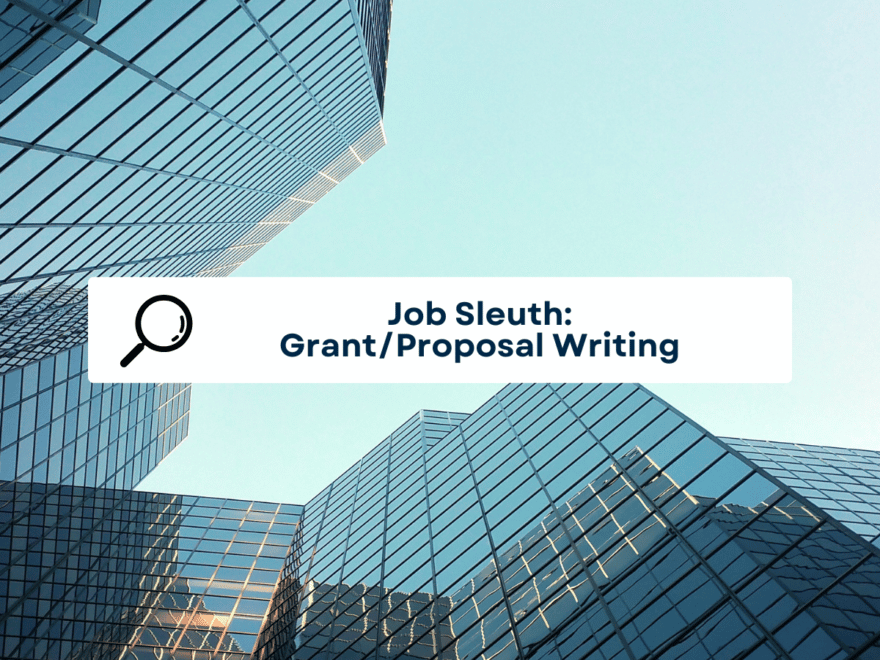When students decide to pursue a career in professional writing, grant writing might not immediately come to mind. However, knowing how to write grants and proposals is an important work skill even if you have no intention of pursuing that industry. That’s why Professor Lisa Dush’s WRD 526 Grant and Proposal Writing class for graduate students is popular year after year. Students from other departments flock to it too–not just the WRD folks.
So we asked Professor Dush to tell us a bit more about her class and how the skills you learn in WRD 526 can help prepare you for a job in professional writing.
What Do Students Learn to Do in a Class like Grant and Proposal Writing?
“So much!” Dush said. “Grant and proposal writing forces—or at least encourages—you to write succinctly and truthfully: it’s easy to be mushy with details in writing, but that sort of writing makes for an obviously weak grant proposal. Also, some students who take WRD 526 have never written in a highly constrained genre like that of the proposal: forcing yourself to say everything you want in 250 words or within section headings that you can’t modify is often a terrific challenge for students who are used to the fairly flexible structure of the academic essay. These constraints prepare you for the many constraints of professional writing.”
“Also, I think that proposal writing can be a mindset shifter if you think of it, as Johnson-Sheehan says, as a ‘tool for managing change.’ It puts you in the mindset that you (and your profession and your world) can change, and that by writing proposals you can intentionally move forward,” she added.
What Kinds of Jobs Are There?
- Grant writing
- Proposal writing
- Development positions
- RFP (requests for proposal) writing
“We’ve had several recent MA in WRD students do grant writing after graduation—Rachel Larrowe worked for a year writing grants for a large social service agency before she went back for her Ph.D., and Riley Yaxley works in a Resource Development role for an arts network,” Dush explained. “A good number of SWAN [Strategic Writing and Advancement for Nonprofits] certificate students have gone into careers in nonprofit development, which is a close kin of grant writing.”
Job Boards
- Grant Professionals Association
- Work for Good
- National Council of Nonprofits
- Upwork [for freelance gigs]
Are Grant or Proposal Writing Lucrative Careers?
“The primary way I think of proposal writing is as a skill that can make whatever career you choose more lucrative,” Dush said. “For example, if you have an academic career, skill with proposal writing can help you to bring in more money to fund your work. If you work in communication or development and can write grants, that can bring more money to your organization and help you advance more quickly up the career ladder. There are some—though not tons—of full-time proposal-writing jobs at government agencies, in large nonprofits, and in university advancement departments. A lot of grant writing is done by consultants: a fairly novice grant-writing consultant might charge $50/hour for doing that work, but if you win some grants and get a good reputation, you could probably charge $150/hour.”
Internship Opportunities
Like with any career, getting experience is a big step in the right direction–especially if you’re curious about your compatibility with a particular/specific job. These are some opportunities to get to know grant or proposal writing in a professional setting.
How Did Prof. Dush Get Involved In Grant/Proposal Writing?
“I’ve been proposing things for most of my professional life; I’ve written conference proposals, proposals for chapters in special issues, consulting proposals (back when I had a digital storytelling training business), and many internal grant proposals at universities I’ve worked at,” she explained. “Back in 2018, I asked if I could take a turn at teaching WRD 526, which Prof. Ceraso had taught expertly for many years. Since then, I’ve gotten even deeper [into] the world of grants and proposals: a key part of my job at DePaul now is running a grant-funded initiative, HumanitiesX, which is supported by a 4-year, $750K grant from the Mellon Foundation. I’ve learned a lot about reporting, compliance, and other grant work by virtue of that job.”
